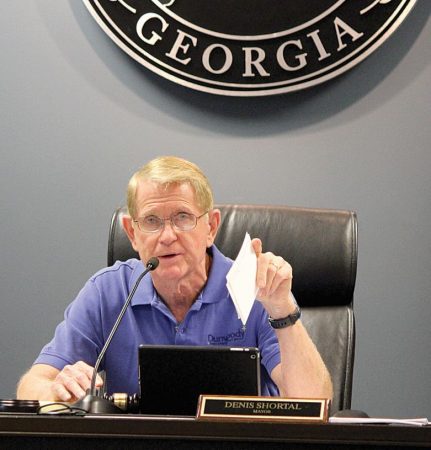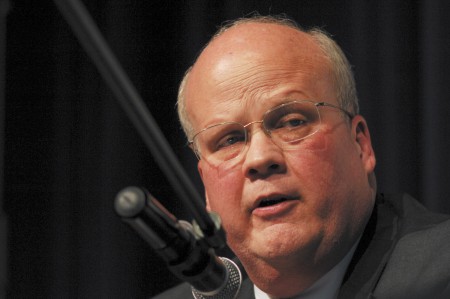Hundreds of people decked out in red-white-and blue lined Mount Vernon Road and cheered as local war veterans rode past in classic cars. They were celebrating Independence Day at the annual Fourth of July Parade, the state’s largest, sponsored by the Dunwoody Homeowners Association.

But the DHA is not just about parades and celebrations. Since the 1970s, the nonprofit organization that once boasted thousands of members has been a political powerhouse in DeKalb County and Dunwoody, playing key roles in shaping the development – from zoning requirements and architectural style of buildings – of one of the state’s newest cities.
A recent move by Dunwoody Mayor Denis Shortal and city officials, however, is putting that power into question. An email from city attorneys was sent last month to members of the DHA who also serve on the Planning Commission, Zoning Board of Appeals, Construction Board of Adjustment and Appeals, and the Design Review Advisory Committee mandating they choose between the board and DHA.
The reason? Potential conflict of interest that could cost the city millions in lawsuits filed by developers who may appeal one of the board’s decisions.

“You have set yourself up for an appeal … and you are most likely going to lose. That’s probably a weak term for me. You’re going to lose,” Shortal said at a June 24 special called meeting to discuss the email. The mandate was suspended at the meeting and the council voted to bring in outside legal counsel to determine whether or not a conflict of interest exists.
Shortal also said at the meeting that the potential lawsuits could potentially bankrupt the city. “The city does not have deep pockets,” he said, “… and litigation could lead to financial ruin.”
The city is currently facing at least two lawsuits by developers – a $5 million federal lawsuit by the Center for Discovery that attempted to locate a personal care facility on Manget Way approximately two years ago. The rezoning request was eventually denied by the city amidst strong outcry by neighbors.
The other lawsuit involves a developer wanting to build two houses on a piece of property in Dunwoody Club Forest, also about two years ago. Strong outcry from neighbors again led to the city to deny the developer’s request.
Shortal said at the June 24 meeting that the DHA served its purpose before the city was incorporated and he believes the two entities should be completely separated now.
“At the time, the DHA was a quasi-government … today you have an elected government,” he said.
DHA President Robert Wittenstein said the city issuing such a directive because it fears lawsuits is not how a city should act.
“[Shortal] is using a common technique — fear, uncertainty and doubt, or FUD — and I resent that,” Wittenstein said during public comment at the June 24 meeting.
The goal of a city government is not to minimize litigation, Wittenstein said, but to operate in the city’s best interests. Sometimes that means going to court to stand up for doing what is in those interests, he said.
The city’s email also stated that if any of the recipients talked about its contents publicly, they could face a city ethics charge and could be found guilty of violating the city’s charter or even state law.
Wittenstein said he is deeply troubled by Shortal and the city’s actions, especially the apparent covertness.
“My hope is that we can educate the council and staff on what the roles are [of DHA members and city board members] and how they can coexist,” Wittenstein said.
Henly Shelton, a former City Council candidate, said he believes it is “absolutely a conflict of interest” for DHA members to serve on city boards. “I’m 100 percent behind Denny,” he said of his support of the mayor.
“The DHA does a wonderful job with the parade, with food trucks … but they don’t represent myself or others,” he said. “They are usurping the power of the council. I say, thank you [to DHA] for their service, now give away to our elected officials.”

Wittenstein said DHA is no different than any other organization voicing opinions about city issues. However, the DHA has entered into contracts with developers. During the recent Crown Towers proposed massive mixed-use development project, DHA entered into an agreement with developers to pay the city $2,000 for each of the 380 residential units it wanted to build.
Council members became visibly frustrated with DHA’s negotiations during a council meeting discussing the project, noting that the city cannot enforce a DHA contract.
“Homeowners have a special interest,” Wittenstein said. “DHA was founded for homeowners to have a voice in development. That’s been our core mission. “
“It’s ludicrous to think the only voice for residents to be the city council,” Witttenstein added.
The DHA was formed about 1970 by longtime residents in response to residential and commercial development coming to the suburban enclave, using its strength in numbers to influence the DeKalb County Commission to approve only certain kinds of developments.
The DHA is the place developers usually come to first when they are seeking rezoning for a project. Political candidates continue to stop by their monthly Sunday meetings seeking votes.
And when it came time for Dunwoody to officially become a city, the DHA wielded its power in the General Assembly and with residents to make it happen.
“The elders of the area formed DHA. When the community started developing and there was a look and feel the residents wanted, the DHA made it happen,” said City Councilmember Terry Nall, who moved to Dunwoody in 1998.
“DHA was not only an advocate but also a resource for neighborhoods, particularly on issues of zoning,” Nall said.
Because DHA members were active in the community and informed on zoning codes and other regulations, it made sense that many of them were appointed by newly-elected city officials to city boards and commissions. That tradition has continued.
The question of DHA members serving on such boards as the city Planning Commission has been raised before. A 2010 story in the Atlanta Journal-Constitution reports a public debate on the issue coming up at a City Council work session.
At that time, a conflict of interest also was the concern and whether DHA members would negotiate privately with developers, only to vote later on those projects as planning or zoning board members, the AJC reported.

Nall, who attends all DHA meetings, said the City Council has been discussing for some time whether there is a conflict of interest for DHA members to also serve on city boards and sought input from the city’s attorneys. That led to a private memo with the legal opinion that one does exist.
However, the email being sent out attached to that memo stating DHA members must choose DHA or their city appointment was not part of any council decision, Nall said.
“How we got from there [the legal opinion] to the email, I don’t know,” he said. “Because we had not established a policy, an email should not have gone out.”
Nall made the motions that were approved June 24 to suspend enforcement of DHA members resigning from the homeowners association or city board and to ask the city manager to provide cost estimates and recommended names at the July 11 City Council meeting for outside legal counsel to give a second opinion on conflicts of interest.
Most importantly, Nall said, the issue needs to be discussed publicly. “It’s important we do things right and that the community has the ability to weigh in so they can understand the why,” he said.
